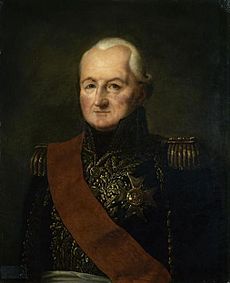Charles du Houx de Vioménil facts for kids
Quick facts for kids
Charles Joseph Hyacinthe du Houx de Vioménil, Marquis of Vioménil
|
|
|---|---|
 |
|
| Governor general of the Windward Islands & Governor of Martinique (acting) |
|
| In office July 1789 – April 1790 |
|
| Preceded by | Claude-Charles de Damas de Marillac |
| Succeeded by | Jean-Pierre-Antoine de Béhague |
| Personal details | |
| Born | 22 August 1734 Ruppes, France |
| Died | 5 March 1827 (aged 92) Paris, France |
| Occupation | Soldier |
| Military service | |
| Allegiance | |
| Branch/service | Army |
| Battles/wars | |
Charles Joseph Hyacinthe du Houx de Vioménil (born August 22, 1734 – died March 5, 1827) was a famous French soldier. He became a Marshal of France, which is a very high military rank. He was also known as the Marquis of Vioménil.
Vioménil had a long and interesting career. He fought in many important wars and held important positions. He served his country for over 70 years.
Contents
Early Military Career
Charles du Houx de Vioménil joined the French army when he was just 13 years old. He started as a lieutenant in the Limousin regiment.
First Wars
He fought in the War of the Austrian Succession. During this war, he took part in the Battle of Lauffeld. He also helped capture a place called Bergen op Zoom.
Later, he served in the Seven Years' War. He worked as an aide to General François de Chevert. This was from 1757 to 1758.
Promotions and New Roles
In 1760, Vioménil was honored. He was made a knight of the Order of Saint Louis. This was a special award for French soldiers.
He was promoted to colonel in 1761. In 1768, he led an infantry brigade. This was during the time France took over Corsica. After returning to France in 1769, he became a colonel of the Légion de Lorraine in 1770.
Service in America
In 1780, Vioménil was promoted again. He became a maréchal de camp, which is like a brigadier general.
Fighting in the American Revolution
He went to America to help the American colonists. He served under General Rochambeau. They fought together in the American Revolutionary War. Vioménil was part of the important Yorktown campaign. This battle helped America win its independence.
After the War
After he came back from America, he became an inspector-general of the cavalry. This meant he oversaw all the horse soldiers. He held this job from 1783 to 1788.
Governor of Martinique
From 1789 to 1790, Vioménil served as a governor. He was the governor of Martinique. This is an island in the Caribbean that belonged to France.
French Revolution and Exile
The French Revolution began in 1791. Vioménil decided to leave France. He joined the army of Condé. This army was made up of French nobles who wanted to bring back the king.
Service in Russia
In 1798, he started working for Russia. He became a lieutenant-general in the Russian army. He commanded an army in Lithuania.
He was first chosen to lead Russian forces in Italy. But he was replaced by Alexander Suvorov. Instead, Vioménil was sent to Jersey and Guernsey. These are islands near France. The plan was to invade France together with other armies.
When the Russian troops went home, Vioménil moved to Portugal. But he had to leave Portugal in 1803. The French ambassador, Jean Lannes, asked him to leave.
Later Life and Honors
The old royal family returned to power in France in 1814. This was called the Bourbon Restoration. Vioménil was made a Peer of France. This was a very high title.
Supporting the King
During the Hundred Days, Napoleon returned to power for a short time. Vioménil stayed loyal to King Louis XVIII of France. He followed the king to Ghent.
After Napoleon's final defeat at Waterloo, the king returned. Vioménil was given command of a military division. This division was based in Bordeaux.
Final Awards
In 1816, when he was 82 years old, he received his highest honor. He was made a Marshal of France. The next year, he was made a marquis.
In 1820, he received the Order du Saint-Esprit. This was another very important French honor. In 1823, he became an Officer in the Légion d'honneur. This is France's highest award.
Vioménil lived a long life. He died on March 5, 1827, in Paris.
See also
 In Spanish: Charles du Houx de Vioménil para niños
In Spanish: Charles du Houx de Vioménil para niños

